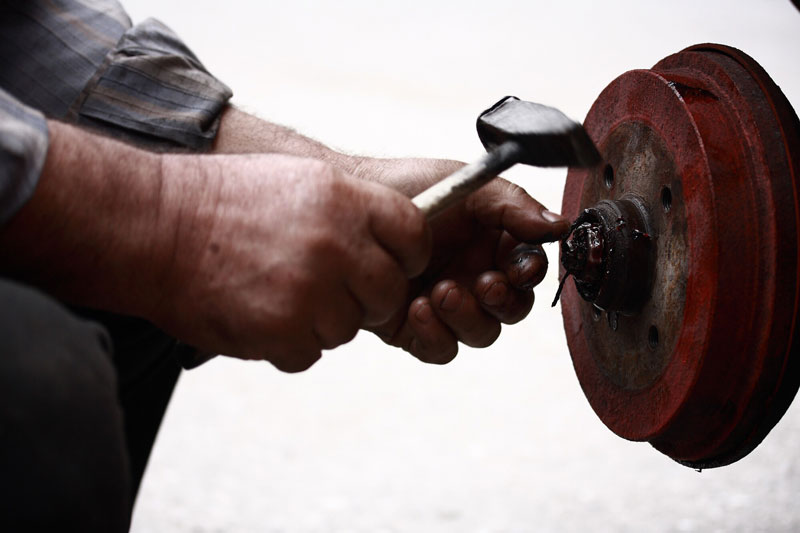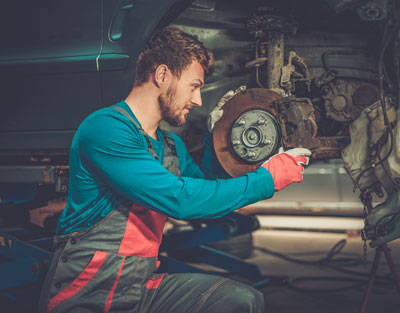Brake failures are responsible for about 5% of vehicle accidents in the United States each year. Clearly, brakes are critical safety features and should be maintained regularly.
While the average life span of brake pads is about 50,000 miles, your driving habits can affect their lifespan. That’s why it’s essential to know the signs that your brakes need repair.
If you notice any of the following, take your car in for brake repair:
1. Grinding or Squealing
This is a classic brake problem, and it occurs when brake pads have been worn down to the metal. Brake repair or replacement should be your first priority if you notice this sound.
If ignored, brake pads wear can lead to further damage to the rotors and calipers of your vehicle. This will not only cost more money but also be a safety hazard.
It’s important to get brake repairs done right away to avoid braking issues that create dangerous situations on the road for both you and other drivers.
If you’re not sure whether brake repair is necessary, take your car in for a brake check. A professional mechanic can examine the condition of your brakes and let you know what repairs are needed.
2. Vibrating Brake Pedal
If you brake and feel your brake pedal vibrate, it may signify that the brake rotors are warped. The vibrations occur because the brake pads do not even make contact with the brake rotor.
Warped rotors can happen after driving on uneven terrain or due to excessive heat from braking. This issue requires brake repair as soon as possible to prevent further damage and avoid accidents.
Keep in mind that you might need new brakes entirely rather than just repairs if this issue is ignored. Take your car into an auto shop right away for a brake check to see what needs to be done before things become worse.
3. Low Brake Fluid
Low brake fluid is a sign of brake line leaks. This can be caused by rust, corrosion, and other brake problems.
If you notice that the brake level has dropped significantly in your brake master cylinder reservoir, it’s time to have your brakes checked before they fail.
Suppose low or contaminated brake fluid isn’t addressed soon enough, and leaks continue. In that case, air will enter the braking system and make them less effective at slowing down or stopping your vehicle when necessary.
4. Brake Pedal Feels Soft
If the brake pedal feels soft or like it’s padding, brake repair is necessary. You may find that you have to push your brake pedal down farther than usual and that the brake response time seems slower than normal when braking at speed.
A leak can cause this issue in brake lines due to rusting from rainwater exposure over time or corrosion caused by salt deposits on metal surfaces during winter driving conditions (due to road salting).
If the brake fluid leaks, the brake pedal will feel spongy because air has entered the system. This can be fixed with brake line repair, but it’s important to address this problem as soon as possible to avoid complete brake failure.
5. Brake Pedal Is Hard or Stiff
When you press down on the brake pedal, it should feel firm but not too hard. If it feels hard or stiff, that means brake fluid is not flowing correctly into your brake system.
Generally, this would mean there’s something wrong with the brake lines or brake calipers. Brake lines carry brake fluid from the master cylinder down to each wheel. If you have a leak in one of these lines (like rust), it can cause the brakes to become too firm and hard to press down on.
Brake calipers are located at each wheel, and they push two thin pads against the spinning rotor whenever you want to stop your car. If the brake fluid isn’t flowing properly through them, it will make it harder than usual to apply pressure to your brake pedal.
6. Car Pulling to One Side When Braking
When brake pads wear down, they cause the brake calipers to press unevenly on both sides of your brake rotors.
Brake rotors are what the brake pads squeeze when you step on the brake pedal, which slows or stops your car’s wheels. So, if there is an imbalance in braking force between the left and right wheels, this can cause a vehicle to pull during braking.
A common sign that you need brake repair is when your car pulls to one side while braking at high speeds, such as going downhill. If not corrected immediately, it could lead to more serious problems with your braking system, including brake failure.
Be sure to have brake repair services performed as soon as possible if you experience this symptom. Trust the experts at a brake repair shop near you for quick and accurate repairs.
7. Brake Light On
The brake light on your dashboard alerts you when problems with the braking system. It is vital never to ignore this warning sign and get brake repairs done immediately.
When brake pads wear down, they cause a brake sensor to become depressed, triggering a brake light indicator in your car’s dashboard.
This is why it’s crucial that you immediately take action if you see that your brake lights are on. Driving without properly working brakes can be dangerous for yourself, other drivers, and pedestrians.
Signs You Need Car Brake Repair
These are just some of the signs that you may need brake repair. If you experience any of these symptoms, don’t wait—take your car to a brake repair shop near you as soon as possible.
If you are looking for brake repair near me, contact us today! We have a team of experienced professionals who will be able to help diagnose and fix your car’s braking problems.



Recent Comments